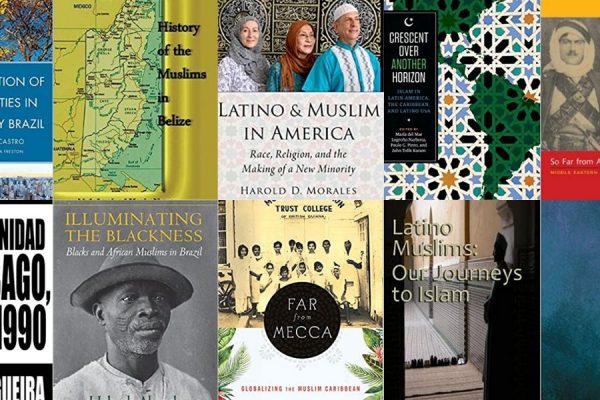Young Muslims might continue to flourish in their faith, but through practices and avenues some might not expect. Their experiences with mosques, religious leaders, and student groups deserve more attention, in order to try and uncover why they are reporting harm from religion at higher rates than their peers.
Young Muslims might continue to flourish in their faith, but through practices and avenues some might not expect. Their experiences with mosques, religious leaders, and student groups deserve more attention, in order to try and uncover why they are reporting harm from religion at higher rates than their peers.
Muslims are the world’s fastest-growing religious group in the world, mainly because of the large numbers of young people who belong to the faith. While historically large groups like White evangelicals are aging in America, Muslims maintain the youngest median age at 33.
Yet, relatively little is known about how the experiences of young American Muslims today compare to that of their peers. According to a new report from Springtide Research Institute, young American Muslims are flourishing in their faith and holding on to organized religion, even as they experience more harm from religion than their peers.
The report, known as The State of Religion & Young People 2021, is the result of a year of research into the beliefs, practices, values, and relationships of young people ages 13-25 (Gen Z). The study, which included a nationally-representative sample of 10,274 surveys (373 of them Muslim participants) and 65 interviews, found that while many young people are breaking away from traditional religious norms and doing things unconventionally, the experience of young Muslims is unique from their peers.
Thriving in uncertainty
The report points out that while uncertainty is one of the hallmarks of being young, what Gen Z has experienced is atypical from previous generations. “This past year has brought unprecedented challenges. Uncertainty has been the air we breathe,” the report reads.
While the uncertainty of the last several years has had a measurable impact on the well-being of Gen Z, the data in the report showed that most religious young people fared better than their non-religious peers, reporting higher rates of flourishing in life, at work, in relationships, and more.
This is especially true for young American Muslims. They report flourishing at an even higher rate than other religious young people, in their relationships with their family, mental and physical health, at work, and in their relationships, to name a few. The largest gap between young Muslims and their peers was reported when asked about their faith life; Muslims report flourishing in their faith nearly double (35%) in comparison to their peers (19%).
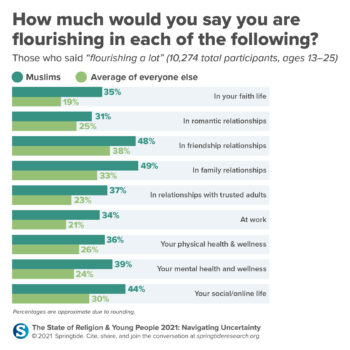
Their faith life is not the only area where a large gap appears. In fact, whether it’s their online social lives, work, mental and physical health, or real-life friendships, most of these categories illustrate young Muslims as a whole flourishing at least 10% more than their peers.
Maintaining trust
The report highlights that, overall, young people are losing trust in traditional religious institutions. Springtide found that although the majority of young people consider themselves at least slightly religious (71%) or spiritual (78%), most aren’t turning to religious institutions in times of difficulty or uncertainty.
As a case in point, only 16% of young people report turning to “someone from [their] faith community” during a challenging time, the same percentage as those who turned to “no one.” Of those who identify as “very religious,” less than half (40%) found connecting with their faith community to be helpful during challenging or uncertain times.
However, young Muslims are the most likely to report that they trust organized religion “a lot” or “completely” (59%).
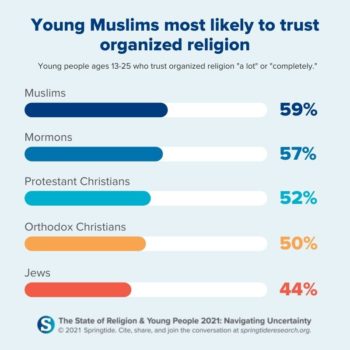
Interestingly, young Muslims maintain the strongest degree of trust for organized religion despite the fact that they also report experiencing the most harm from religion. A third of young American Muslims (33%) strongly agree, “I have been harmed by religion, faith or a religious leader in the past.” Young Muslims are also more likely than their peers of other major religious groups to agree, “Religious communities and leaders don’t care about the things I care about.”
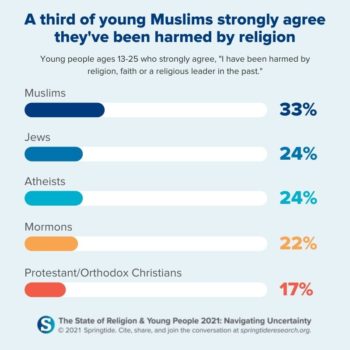
One possible explanation is that young Muslims are more likely than their peers to attend religious gatherings (e.g. prayer) on a daily basis. Therefore, they’re simply given more opportunities to experience disappointment or harm.
Given the frequency with which young Muslims engage with mosques, another possible explanation is that young Muslims are simply more involved and invested in their religious institutions than their peers, and therefore have stronger feelings about their experiences.
Taking to the streets
A third possible explanation for the disproportionate experiencing of harm is that young Muslims, being a minority group that is more vulnerable to discrimination and phobia in American society, are simply more acquainted with and aware of harm and its effects than some of their peers. Therefore, they’re more likely to detect it and report it as such.
Relatedly, Springtide’s study found that young Muslims are the most likely group to report that they participate in faith-inspired acts of protest. Nearly 6 in 10 (59%) of young Muslims report that they participate in faith-inspired acts of protest at least monthly, followed by Hindus (52%), Jews (51%), and Buddhists (50%). They appear to be more likely than their peers to be actionable about the harm and injustice they perceive in society.
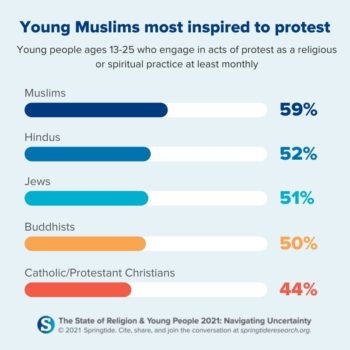
This trend is occurring in the context of Gen Z having a broad view of what constitutes a spiritual experience. Rather than finding a religious identity, practice, community, and language in one closed system, more and more young people are piecing together their inner life from a variety of influences and resources. Springtide calls this combination of institutional disconnection and transference to other spiritual practices “faith unbundled”.
It may surprise some to learn that nearly a quarter of young Muslims say they engage with tarot cards or fortune-telling (23%) on a daily basis, which is not far behind the proportion of those who study a religious text daily (31%). A larger percentage of young Muslims report engaging with art or music (53%) or being in nature (52%) as spiritual practices on a weekly basis than those who attend a religious service on a weekly basis (46%).
Conclusion
Though this embrace of unconventional spiritual expressions might seem startling, it’s important to remember that young Muslims report that they are flourishing at a degree in their faith lives that is nearly double their peers. In other words, whatever young Muslims are doing to keep the faith during these uncertain times, it appears to be working.
As this large generation of young Muslims becomes increasingly visible and influential in American society, it is important to be informed about their experiences and perspectives, as well as general trends in Gen Z’s spirituality to which young Muslims are no exception.
Young Muslims might continue to flourish in their faith, but through practices and avenues some might not expect. Their experiences with mosques, religious leaders, and student groups deserve more attention, in order to try and uncover why they are reporting harm from religion at higher rates than their peers.
One thing is sure: As active civic participants who are willing to make their voices heard, young Muslims will likely rise to a degree of leadership and influence in American society that previous generations of Muslim Americans haven’t experienced before. How they do so while negotiating their Muslim identity will be fascinating to observe.

